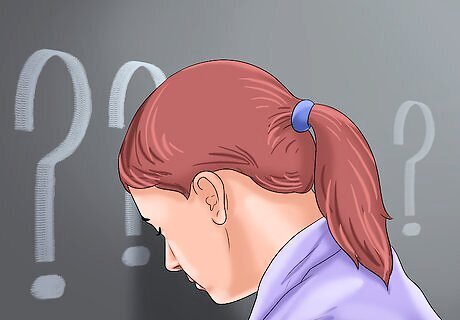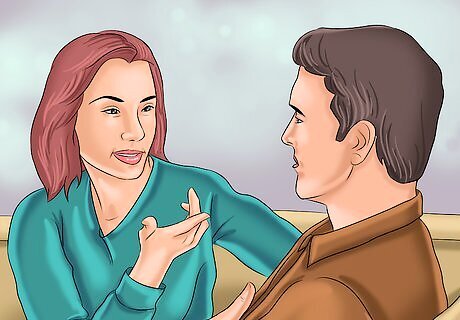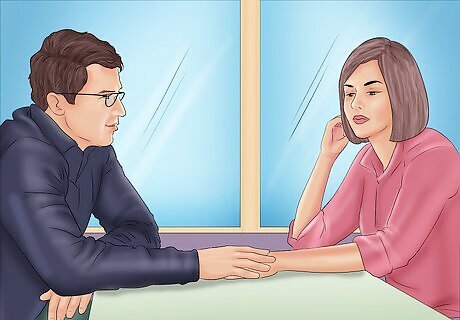
views
Falling in Love

Explore your feelings. Is it really romantic love, or are you trying to create something that isn’t there? Is it just physical attraction or a matter of convenience? Be sure of your attraction before you talk to your best friend. Some questions you can ask yourself: Are you trying new things to impress your best friend? Are you investing more time in your best friend? Are you more anxious or emotional when around your best friend? Do you find yourself imagining what it would be like to date your best friend? Have you noticed your best friend looking at you differently or complimenting you?

Determine compatibility. Falling in love is fun, but to fall in love with your best friend might be riskier since you don’t want to ruin the friendship. Think about how compatible you and your friend are by considering if you share: Basic moral and religious values Similar levels of intelligence Similar interests and hobbies A willingness to share Similar temperaments Attraction to each other

Consider the pros and cons. You already know you best friend really well, you probably feel like you can be yourself around him or her, and they probably already support you, respect you, understand you, and listen to you, or you wouldn’t be best friends. Now think about the potential consequences: You might change the dynamic of your mutual friend group. Your friendship might end if they don’t share the same romantic feelings. You might end up breaking up if you do become more than friends.

Make a choice. Once you know whether or not your feelings are legitimate, decide if you want to tell them your feelings. Decide if you can let go of any fear you have of losing or changing your friendship.
Sharing Your Love

Make your move. Now it's time to talk to your best friend about your feelings. Share with them that you’d like to take things to a different level. It may be awkward or difficult to talk about, but you’ll likely regret not expressing how you feel. Talk to them in person, not via text or social media. Find a private place to talk. Be truthful and direct. You can say, “You’re a good friend to me. Lately I’ve been feeling that I like you as more than a friend. I think I’ve noticed that you might like me, too. Can we talk about it? I know it might be awkward and I don’t want to ruin what we have.” Be aware of timing. Don’t approach your best friend with this talk if either of you are intoxicated or in a relationship with someone else.

Determine expectations. If they share your feelings, and want to move beyond friendship with you, determine what each of you wants. Do you want to date? How do you want to define yourselves? Is one of you just expecting to be friends with benefits? If your best friend wants more of a “friends with benefits” type of situation, and you agree to it even though you’re experiencing more love-like feelings, you may end up hurting yourself and feeling like you have to hide your deeper feelings. Don’t go into one of these types of relationships holding back your true feelings and expecting love to build on their side. Be open and honest about what you both want if this relationship doesn't work out.

Date your best friend. Don’t skip the dating phase just because you know each other pretty well already. Take your time to get to know each other as romantic partners, instead of just friends. Dating will help make things less intense and allow you to break away from the routine of friendship. Make each other dinner. Explore new hobbies together. Keep your mutual friends out of your relationship for now. Create boundaries. If you spent all your time together as best friends and talked about everything, take a step back from that pattern now that your relationship has changed.

Become more intimate. Get to know each other more deeply by talking about your hopes, dreams, and goals for the future. Take a trip together, just the two of you. Consider asking each other more meaningful questions, which were designed by a psychologist to create more intimacy between two people. What do you feel most grateful for in life? If you could change anything about the way you were raised, what would it be? What do you value most in our friendship? What positive characteristics do you like most about each other?

Break the physical barrier. It might be awkward at first, or it could be wonderful, but you won’t know until you try and transition your friendship into something more intimate. Remember that sex complicates things, so keep in mind to: Set boundaries for physical intimacy. Talk about these boundaries and your expectations. Respect each other and listen if the other person says “no.” Check-in regularly on your feelings.
Staying in Love

Nurture each other. Give your partner attention and affection. Express gratitude and admiration. Compliment your partner, give them gifts, write them notes or do small favors. Make a goal of having a ratio of 5:1. For every five positive interactions, only have one negative one.

Influence each other. Do things that make each other happy. Show interest in your friend’s needs, goals, and desires. Share your dreams for your future together. Be willing to change with them.

Maintain communication. Continue to express your feelings openly and honestly to your friend/partner. Remember not to just focus on yourself: ask how they're feeling and really listen. Check-in regularly about what they want and need. Be direct, clear, and calm with one another. If you're having an argument with each other, you can say, "I feel angry when you..." rather than saying "you make me so angry!"

Create a shared meaning. Kind of like creating a mission statement for a business, create a mission statement for your relationship. Have a shared purpose and vision for the relationship you’re building. Have shared values and strive to meet those values with each other.

Stay friends if you break up. It's possible you'll break up, even if you do all of the right things in your relationship. Take comfort in the fact that at least you tried! If you do break up, keep in mind that staying friends may be challenging at first, but it is possible for some couples, especially if it's a mutual break-up and if you ended on good terms. Take some time apart. Don't try to go back to being "just friends" right away. Give it at least half the length of the relationship. Set new boundaries for your friendship. For example, you may not want to talk to them about other romantic partners or intimate feelings. Be careful where and how you spend time. Don't do date-like activities, as this may send mixed signals.




















Comments
0 comment